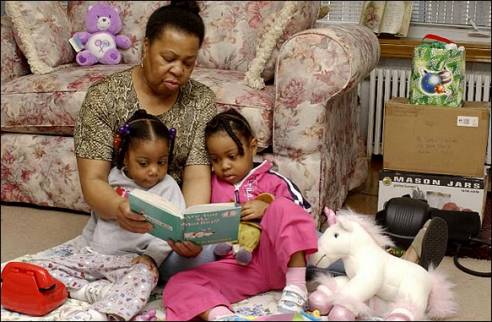|
|

Grandma Finds a Job, Looking After Junior
By Karen Alexander, The New York Times
April 13, 2004
Lots of grandparents fantasize about quitting their jobs and spending more time with their grandchildren.
For Jannie Mae Williams, 60, of Meriden, Conn., who retired from her job last May to become a full-time paid caretaker to her two young grandchildren, the dream is a reality - and a much harder job than she ever could have imagined.
As the baby boom generation approaches retirement age, many older workers are eyeing second careers as nannies for their grandchildren. Grandparents who are already doing the job say they experience great satisfaction, and their adult children say there is peace of mind knowing that their children are cared for by loving family members.
But both generations warn that it takes enormous physical energy and new reserves of patience to enter what is essentially an employment relationship between parents and their children.
"It requires you to have a really good parental relationship and a very good friendship," said Joyce Jones, Ms. Williams's daughter and a legislative attorney for the State of Connecticut.
Last June, Ms. Williams began caring for her granddaughters, Sierra, 4, and Savanna, 2, after taking early retirement from her job working with mentally retarded adults at a Connecticut state home. She originally watched the girls every day; now they are with Ms. Williams three days a week and they go to preschool the other two days.
The arrangement has worked out so well that Mrs. Jones and her husband are remodeling their home in Burlington, Conn., so that Ms. Williams can sell her house in nearby Meriden and move in.
Ms. Williams is a divorced mother of five who raised her children on her own. This time around, she says, she benefits from those years of experience, and from knowing that she can return the two energetic girls to their parents at the end of the day.
"It's not like starting out being a new mom and you have to learn everything," Ms. Williams said. "But you don't realize you have all that energy when you're young. When you get older it's like, `Oh, my God, I'm so tired.' "
Although Ms. Williams has saved the family some money compared with traditional day care, Mrs. Jones says she is helped most by the fact that she can concentrate on her job without worrying about her children.
In return for her work, Ms. Williams receives what her daughter describes as "nominal" pay. "There is some financial arrangement between the two of us, but it certainly doesn't represent the quality of the care that she gives my children," Ms. Jones said.
For most families who make use of a grandparent for child care, the arrangements require mature communications between parent and grandparent, and a willingness to discuss potential conflicts.
"You have to have a really good relationship with your child, and you have to understand that the grandchildren are not your children," said Tanis Harris, a semi-retired school administrator in Encino, Calif., who two mornings a week cares for her granddaughters, ages 3 and 5.
"Child-rearing techniques have changed," Mrs. Harris said, "and you have to accept the new things and be willing to give advice when asked" - and hold your suggestions otherwise.
Wai Chan of New York City, a senior marketing manager for American Express, is home on maternity leave with her second child. Ms. Chan's mother, Chun Lee Chan, lives with her daughter's family on the Upper East Side all week, and returns to her home in Chinatown on the weekends. The elder Mrs. Chan, 66, quit her job as a part-time home care attendant for elderly people to baby-sit for her first granddaughter nearly two years ago. She is paid $300 a week. "It's not the market value but a token of our appreciation," Ms. Chan said of her mother. "She wouldn't accept anything more."
The younger Ms. Chan says the situation works well for her, but it does not always please her husband. "He feels that she spoils them," Ms. Chan said.
Christine Panero, 57, of San Carlos, Calif., was trying to save her daughter some money when she retired from her job as a technical writer in 2001 to care for her then 5-month-old granddaughter Katie. These days, Mrs. Panero looks after Katie, now 3, and her sister, Heather, 10 months old, at her home. She is not paid for her work.
"I was looking for an excuse to retire," Mrs. Panero said. "It's a lot of fun, but very shortly I stopped telling people that I was retired. I'm not."
As for her relationship with her daughter, Mrs. Panero said it has been successful because she closely follows her daughter's wishes about how to raise and feed her grandchildren. "I get along fine with my daughter," she said. "She's the mama and we follow her rules."
|
|



